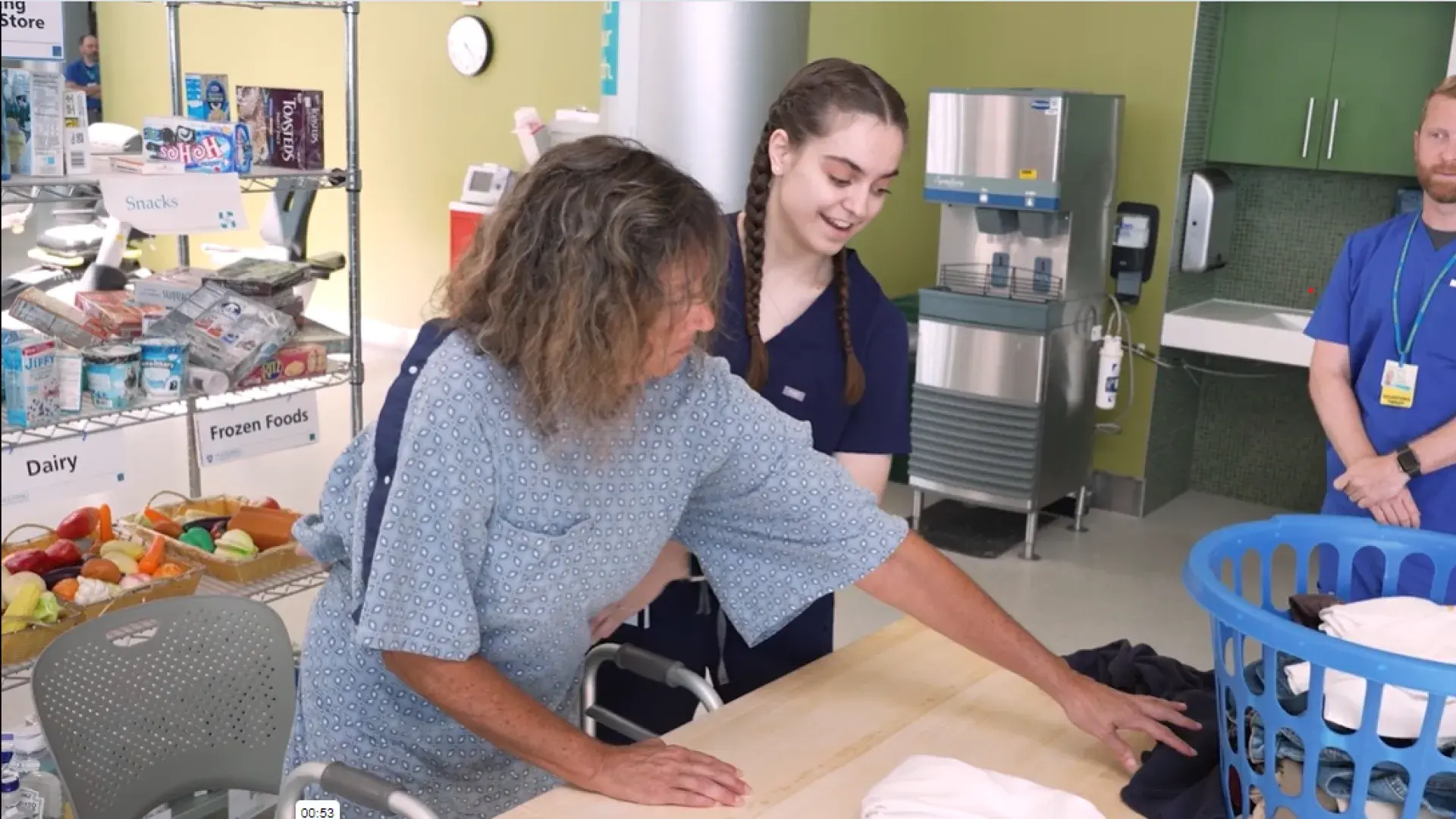
The Entry Level Doctor of Occupational Therapy Program is entering its second decade with a reaccreditation by the Accreditation Council for Occupational Therapy Education
The past year has been a notable one for the MGH Institute’s Entry Level Doctor of Occupational Therapy Program. In April, U.S. News & World Report recognized the program as one of the top in the country and now, an 18-month process to secure reaccreditation has been successful. At a recent meeting, the Accreditation Council for Occupational Therapy Education (ACOTE) voted to grant a Status of Accreditation for a period of 10 years, the maximum a program can achieve.
“It is gratifying that our reaccreditation process recognized our commitment to innovation, experiential and collaborative learning, and evidence-based work,” said Program Director Emily Eddy, “The result and the feedback we received show that what our program is doing in terms of curriculum and research is exceeding the standard.”
In making its decision, ACOTE reviewed the Report of On-Site Evaluation (ROSE), which noted four areas of strength, including the incorporation of interprofessional experiential learning into the curriculum. The report highlighted that, “program graduates and employers describe an exceptional confidence and competence in working with interprofessional teams that will transform practice.”
“The Institute’s ELOTD program is a national a model of excellence in occupational therapy education, exemplifying best practices in interprofessional education and collaborative practice.” says Dr. Regina Doherty, Dean of Interprofessional Education and Practice and former Chair of the Department of Occupational Therapy. “The occupational therapy faculty, in close partnership with the Center for Interprofessional Education and Practice, have masterfully integrated interprofessional learning throughout the ELOTD curriculum. This emphasis on interprofessional collaborative practice has led to remarkable outcomes for our graduates, and I was so pleased to see ACOTE acknowledge and praise this exceptional work.”
The report also lauded the research environment that has led to a “significant increase in peer reviewed publications and presentations by students and faculty as well as capstone projects that, “expand practice,” and involve, “a collaboration and mentorship process [that] inspires graduates to become practitioners who shape the future of occupational therapy practice and contribute to the health and wellness of society.”
In addition to research, another strength of the program is fieldwork experience. “Fieldwork educators remarked that students’ use of evidenced-based practice and readiness to take initiative is exemplary,” according to the report, which went on to say, “As a result, students demonstrate enhanced professionalism, communication skills, and readiness for diverse practice settings.”
“The program is producing occupational therapists who not only have the critical skills needed to care for their patients, but also the ability to publish early in their careers, and the skills and experience that already put them beyond an entry level in the profession when they graduate,” explained Eddy.
The full comments from the ACOTE report on the program’s areas of strength are below:
- The president, provost and dean are lauded for providing exceptional support for faculty scholarship and doctoral advising through the innovative Acceleration Academy and Mentorship Academy. Faculty report enhanced capacity to extend their own scholarship while inviting doctoral students to design individual capstone experiences and projects that align with their research priorities. Students report engagement in research, program development and the translation of evidence into practice as outcomes of their doctoral experience. This administrative support has resulted in a significant increase in peer reviewed publications and presentations by students and faculty.
- The dean of interprofessional education and practice and assistant dean for interprofessional education are lauded for designing the IMPACT curriculum to foster interdisciplinary experiential learning. The IMPACT Practice Center is a dedicated 11,000 square-foot space that houses programming that utilizes medical manikin-based simulations, standardized patients and pro bono clients. The students work in interprofessional teams across three IMPACT courses and many embedded interprofessional learning experiences to develop communication and problem-solving competencies. The program graduates and employers describe an exceptional confidence and competence in working with interprofessional teams that will transform practice.
- The faculty and doctoral capstone coordinator are recognized for developing capstone experiences that align the faculty’s research focus with the students’ interests, and the expressed needs of community partners. This partnership has resulted in capstone projects that expand practice (e.g. Model Systems Programs in Traumatic Brain Injury and Stroke, Functional Needs of Left Ventricle Assist Device Candidates, and Outcomes of an Interprofessional Peer Facilitators Program). The collaboration and mentorship process inspires graduates to become practitioners who shape the future of occupational therapy practice and contribute to the health and wellness of society.
- The faculty and academic fieldwork coordinator are lauded for their intentional integration of evidence and didactic content which is exemplified in five level I fieldwork experiences. The fieldwork experiences have specific assignments connected with parallel courses that include feedback and self-reflection for professional growth (e.g. MGB Salem Partial Hospitalization Program Telehealth Mindfulness Group and Occupational Therapy Center for Learning, Participation and Rehabilitation). Fieldwork educators remarked that students’ use of evidenced-based practice and readiness to take initiative is exemplary. Students highlighted these structured experiences as preparation for the challenges of Level II fieldwork. As a result, students demonstrate enhanced professionalism, communication skills, and readiness for diverse practice settings.
Do you have a story the Office of Strategic Communications should know about? If so, let us know.
